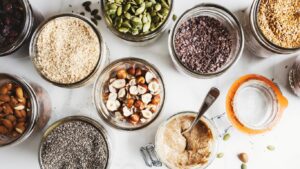Polycystic Ovary Syndrome (PCOS) is a hormonal disorder in women, characterized by the growth of cysts on the ovaries, irregular menstrual cycles, and high levels of androgens (male hormones). PCOS can lead to infertility, insulin resistance, and an increased risk of heart disease, endometrial cancer, and type 2 diabetes.
To manage PCOS, it is important to maintain a healthy weight through a balanced diet low in refined carbohydrates and high in fiber, as well as regular physical activity. This article guides you about some basics of PCOS diet.
Impact Of Diet On PCOS
Insulin levels in PCOS patients are frequently reported to be higher than usual because of insulin resistance. Insulin resistance makes your body produce more insulin to maintain normal blood sugar levels. And when your insulin levels are high, your ovaries may produce more androgens such as testosterone.
A diet high in refined carbohydrates, such as sugary and starchy meals can make it difficult to control insulin resistance and, ultimately, weight loss.
Basics of PCOS Diet
A PCOS diet involves making some dietary modifications by following a low glycemic index approach and including key nutrients.
A low glycemic index approach can help regulate insulin levels and control symptoms associated with PCOS. Some nutrient components and foods to include in diet are
- Fiber helps with combating insulin resistance by slowing down the process of digestion and reducing the effect of sugar on your blood. Some good options for high-fiber foods include leafy greens, bell peppers, cruciferous vegetables, beans and lentils, berries, almonds, pumpkin, sweet potatoes, and winter squash.
- Healthy fats provide energy and aid in hormone regulation. Good options include fatty fish and olive oil.
- Protein is a very nutritious and filling dietary option for those with PCOS and supports overall health. Good options include chicken, fish, and tofu.
- Anti-inflammatory foods may also be beneficial. Good options include kale, spinach, tomatoes, turmeric, walnuts, almonds, fruits, olive oil, and omega-3-rich fatty fish such as salmon.
Tips for Grocery Shopping and Meal Planning for PCOS Diet
- Focus on nutrient-dense, whole foods like fresh fruits, vegetables, whole grains, lean protein, and healthy fats.
- Limit sugary and processed foods, which can worsen insulin resistance.
- Stock up on fiber-rich foods such as beans, lentils, and whole grains to promote fullness and control blood sugar levels.
- Plan and make a grocery list based on your meals for the week.
Ideas for Quick and Healthy Meals and Snacks on A PCOS Diet
- Grilled chicken or fish with roasted roots vegetables and cruciferous such as broccoli and cauliflower
- Salad with mixed greens, tomatoes, cucumbers, nuts, seeds, and a vinaigrette dressing
- Veggie omelet with sourdough bread and avocado
- Goat yogurt with fresh fruit and sprinkled seeds
- Veggie with hummus
- Smoothie bowl with frozen berries, banana, homemade nut milk, and protein powder
- Baked sweet potato with salsa, avocado, and black beans.
Foods to Avoid on A PCOS Diet
- Foods high in sugar and refined carbohydrates, such as cakes, candy, white bread, pastries, sugary desserts, white flour products, fries, margarine, and sugary drinks, should be limited or even cut as they can worsen insulin resistance and inflammation.
- Processed foods, such as packaged snacks and processed meats, should also be limited as they contain added sugars and preservatives and can exacerbate inflammation.
Recommendations for Portion Control and Reducing Processed Foods on PCOS Diet
- Use smaller plates to control portions and avoid overeating.
- Read food labels and choose products with fewer ingredients, minimal added sugars, and limited preservatives. Check food labels for different names of sugar such as high fructose corn syrup, sucrose, and dextrose.
- Cook meals at home using fresh ingredients to control portion sizes and avoid processed foods.
- Practice mindful eating and savor each bite, paying attention to hunger and fullness cues.
Alternative Options for Common Trigger Foods
- Instead of sugary drinks, go for unsweetened tea or simply water.
- Instead of white bread, choose sourdough options.
- Instead of processed snacks, try fresh fruit, unsalted nuts, or popcorn.
- Instead of processed meats, choose lean protein sources like chicken, fish, or tofu.
By making these simple swaps, you can help manage your symptoms and improve your overall health.
Challenges and Strategies for Sticking to The PCOS Diet?
Adopting a PCOS diet can be challenging due to the following:
- The availability and accessibility of healthy food options or not having taste for them
- The need for meal planning and preparation, and
- The difficulty in changing dietary habits.
To overcome these challenges, it is important to have a clear understanding of the dietary goals and the benefits of following the PCOS diet as mentioned in this article.
Staying motivated can be achieved by setting achievable goals, finding a support system, and tracking progress.
Consulting With a Nutritionist for PCOS Diet
PCOS diet focuses on reducing inflammatory foods so you may want to reduce your intake of certain foods such as red meat and can benefit from it, however, it’s best to consult a doctor or nutritionist before eliminating several foods from your diet, as they can provide customized advice based on your needs, and the necessary support and accountability to make sustainable long-term dietary changes. They can also help identify any nutrient deficiencies and provide practical tips for sticking to the PCOS diet.
Key Takeaway
Maintaining a healthy weight and eating a balanced diet low in refined carbohydrates and high in fiber and whole foods can help regulate insulin levels, reduce inflammation, and improve symptoms of PCOS.
A PCOS diet should focus on fiber-rich foods, healthy fats, anti-inflammatory foods, and lean protein, and should limit sugary and processed foods.
Some strategies to stick to the PCOS diet include making small swaps, having a clear understanding of dietary goals, finding a support system, and tracking progress.
Consultation with a nutritionist may be helpful for a personalized and effective approach to the PCOS diet.











